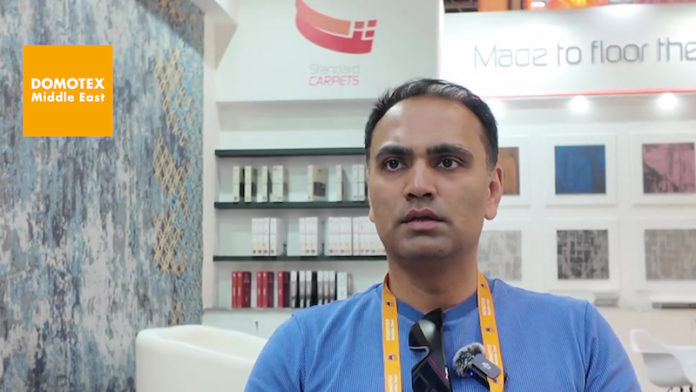Explore the dynamic world of Standard Carpets with Mr. Sharad Bhushan, VP Sales & Marketing, as he shares insights into their innovative solutions, sustainability initiatives, and the promising future of the carpet and flooring sector in the MEA region.
Why is Dubai an excellent location for hosting a carpet and flooring event?
Dubai stands out as an ideal choice for events like Domotex, particularly for flooring exhibitions, due to the high demand for flooring products in the region. With numerous hotels, commercial projects, and airports under construction, there is a constant need for quality flooring solutions. Dubai’s status as a hub for construction activities makes it an attractive destination.
Additionally, its strategic location as a logistics center, with proximity to Asia and access to raw materials from Saudi Arabia, Oman, and Europe, further enhances its appeal. This makes Dubai not only a great place to showcase products and new technologies but also an ideal location for establishing a manufacturing hub.
Sustainability and recycling are major issues in the carpet industry. Landfills are filling up with tons of discarded carpet, and the problem is only getting worse. What are your thoughts on this, and what solutions do you propose?
Sustainability and recycling are significant concerns currently, and I believe many companies are dishonest when they claim to prioritize recycling and sustainability. It’s a misconception because ultimately, everything we use ends up in landfills. Many of these companies that tout themselves as eco-friendly are simply deceiving consumers.
However, we offer an innovative solution: biodegradable fiber. Typically, products like carpets remain in landfills for up to 700 years, posing a significant environmental problem. We’ve developed fibers and backing systems that biodegrade, meaning that when you dispose of our products in a landfill after 5, 10, or 15 years of use, they decompose within about 15 years. This decomposition produces biomass and methane, which can be captured and utilized as renewable energy. Essentially, carpets become a sustainable source of energy for the future, a breakthrough that has never been achieved before.
All the latent energy stored within carpets can now be harnessed and converted into renewable energy, primarily methane. Despite being a small company, Standard Carpets has initiated BioLoop Solutions dotcom, enabling us to have a substantial impact on our customers. Our niche clientele spans the globe, allowing us to present the narrative of biodegradation versus recycling.
Given our size, we have the capability to recycle. However, logistical constraints prevent us from retrieving and recycling products sold in distant markets like America. Therefore, we needed a localized approach. With the introduction of biodegradable fiber, consumers have a compelling story to embrace.
As you rightly pointed out, only 5% of carpets are recycled according to official figures from the Carpet and Rug Institute (CRI). The majority ends up in landfills, contributing to their ever-growing size. Globally, carpet and flooring pose one of the most significant challenges in landfill management, underscoring the urgent need for a solution.
Our small company has successfully developed a solution, and we hope that larger companies will take note and follow suit. The issue with larger companies is their heavy investment in marketing, often claiming to adopt environmentally friendly practices such as product recycling and achieving carbon neutrality.
However, they fail to provide tangible evidence of these claims. They cannot demonstrate their recycling efforts to us or to customers, nor can they prove the environmental impact of their carbon neutrality claims. Essentially, they are merely spending millions of dollars on marketing without delivering concrete results.
In contrast, our company offers a genuine end-of-life solution. Our products undergo rigorous testing, with some showing 50% biodegradation within a year and a half. We have conducted extensive laboratory tests over two years, providing irrefutable evidence of our commitment to sustainability.
In essence, the carpet and flooring industry poses a significant challenge to our world and landfills. It stands as one of the largest contributors to pollution today. For instance, in the US state of Maine, carpets rank as the second biggest polluter of landfills, just after diapers.
We must collectively address this issue. Recycling alone cannot suffice. Transporting products across vast distances for recycling, as some companies do, only shifts the problem elsewhere. Rather, the solution lies in biodegrading the product.
Imagine the Earth consuming the product, much like our bodies digest food. This process turns it into beneficial biomass, nurturing plant growth. Additionally, the methane emitted during biodegradation can be harnessed for renewable energy, as mandated in places like the UAE.
Given this necessity, why not tap into the energy stored within carpets? It’s time to adopt sustainable practices that benefit both the environment and our communities.
What makes the carpet and flooring sector promising in the MEA region?
Historically, the Middle East has been home to numerous companies, with Saudi Arabia and the UAE boasting several major players. With the region’s expanding reach, technological advancements, and abundant manpower, it is increasingly becoming an attractive destination for industries beyond its traditional scope.
Traditionally reliant on imports from Europe and North America, the MEA region now demonstrates a growing capacity for local production. This evolution suggests a readiness to welcome more manufacturing companies, fostering economic growth and enhancing self-sufficiency within the region.
About Standard Carpet:
Standard Carpets is a company with over 22 years of experience in the tufting industry. We specialize mainly in tufted products, focusing on residential and commercial carpet tiles, as well as broadloom for both sectors. Unlike some other companies, we do not engage in printing or weaving. Our core expertise lies in producing products made from solution-dyed fibers, including nylon, polyester, and polypropylene.




